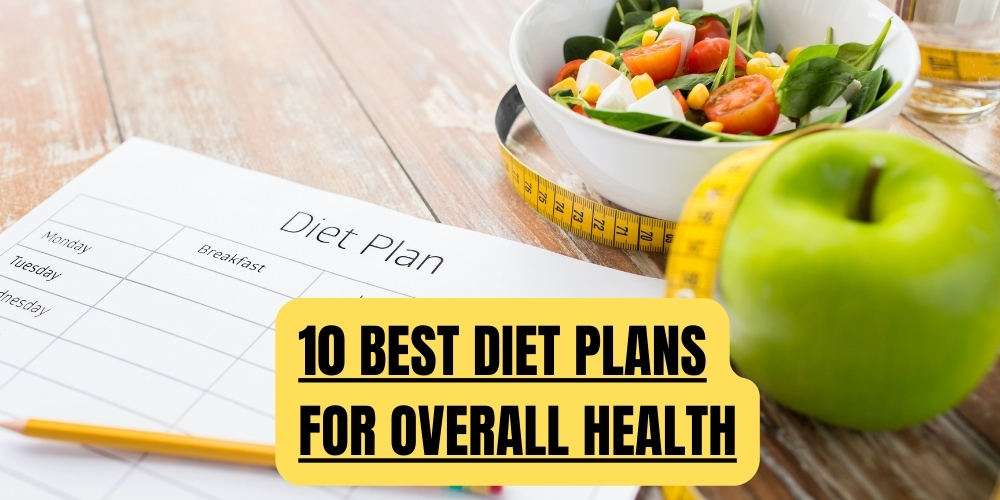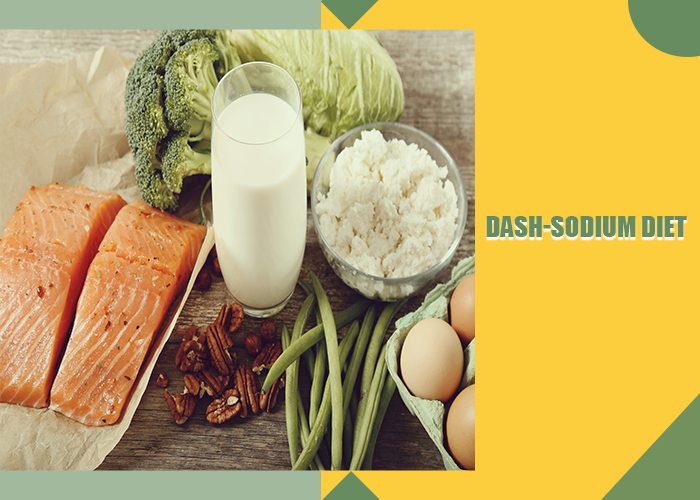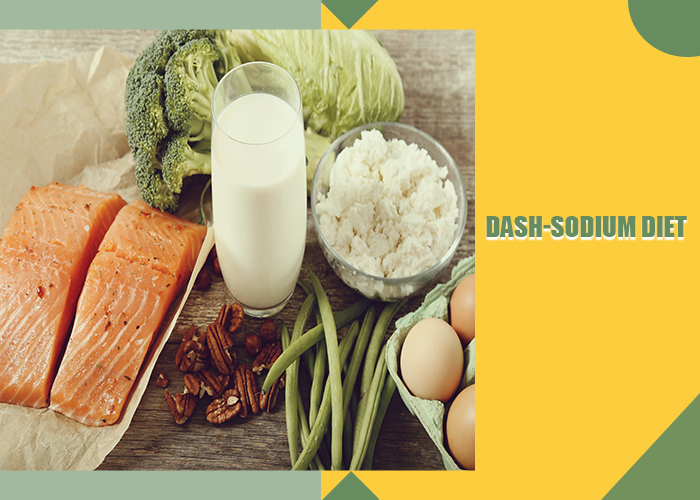Maintaining a healthy diet is essential for overall well-being and long-term health. With numerous diet plans available, it can be challenging to determine which ones are truly beneficial. This essay explores the ten best diet plans that promote overall health by providing balanced nutrition, supporting weight management, and reducing the risk of chronic diseases.10 Best Diet Plans for Overall Health is given below-
10 Best Diet Plans for Overall Health:
Mediterranean Diet:
The Mediterranean diet is renowned for its heart-healthy benefits. It emphasizes fruits, vegetables, whole grains, legumes, lean proteins (such as fish and poultry), and healthy fats (like olive oil). This diet is rich in antioxidants, fiber, and omega-3 fatty acids, which contribute to reduced inflammation, improved cardiovascular health, and better cognitive function. 10 Best Diet Plans for Overall Health is given here:
DASH Diet:
The Dietary Approaches to Stop Hypertension (DASH) diet focuses on reducing sodium intake while increasing potassium-rich foods. It emphasizes fruits, vegetables, whole grains, low-fat dairy products, lean proteins, and limited amounts of saturated fats. The DASH diet effectively lowers blood pressure, reduces the risk of heart disease, and promotes overall health.
Flexitarian Diet:
The flexitarian diet combines the benefits of a vegetarian lifestyle with occasional meat consumption. It primarily focuses on plant-based foods while allowing for moderate amounts of lean meats. This flexible approach promotes weight management, reduces the risk of chronic diseases, and provides essential nutrients found in plant-based sources.
Nordic Diet:
The Nordic diet highlights traditional foods of Scandinavian countries, including whole grains, berries, root vegetables, fatty fish, and rapeseed oil. It emphasizes locally sourced, seasonal, and minimally processed foods. This diet is rich in antioxidants, omega-3 fatty acids, fiber, and vitamins, contributing to improved heart health, weight management, and reduced inflammation.
Vegetarian Diet:
A vegetarian diet eliminates meat but includes plant-based foods like fruits, vegetables, whole grains, legumes, nuts, and seeds. It is associated with lower risks of obesity, heart disease, high blood pressure, and certain cancers. However, proper planning is necessary to ensure adequate intake of essential nutrients like protein, iron, and vitamin B12.
Vegan Diet:
The vegan diet excludes all animal products, including meat, dairy, eggs, and honey. It focuses on plant-based foods, offering benefits such as weight management, lower cholesterol levels, and reduced risk of heart disease. Careful attention should be given to obtain sufficient nutrients like vitamin B12, calcium, and iron through plant-based sources or supplements.
Paleolithic (Paleo) Diet:
The Paleo diet is based on the presumed diet of our Paleolithic ancestors. It includes lean meats, fish, fruits, vegetables, nuts, and seeds while excluding processed foods, grains, dairy, and legumes. This diet aims to provide nutrient-dense foods while eliminating processed and refined products. Although controversial, it may lead to weight loss, improved glucose tolerance, and reduced inflammation.
Whole30:
The Whole30 diet is a 30-day program that eliminates potentially inflammatory foods like added sugars, grains, dairy, legumes, and processed foods. It focuses on whole, unprocessed foods such as meats, seafood, fruits, vegetables, and healthy fats. The purpose of the Whole30 program is to reset eating habits, identify food sensitivities, and promote a healthier relationship with food. By eliminating common allergens and processed ingredients, individuals may experience improved digestion, increased energy levels, and weight loss.
Flexibility-Based Diet:
The flexibility-based diet promotes a balanced approach to eating, emphasizing portion control, moderation, and individual food preferences. It emphasizes the importance of listening to your body’s hunger and fullness cues, making mindful food choices, and incorporating a variety of nutrient-dense foods. This approach promotes a sustainable and enjoyable way of eating that can be customized to meet individual needs and preferences.
DASH-Sodium Diet:
The DASH-Sodium diet is a variation of the DASH diet that specifically targets sodium reduction. It focuses on minimizing sodium intake from processed and high-sodium foods while emphasizing fruits, vegetables, whole grains, lean proteins, and low-fat dairy products. By reducing sodium intake, this diet helps manage blood pressure, lowers the risk of heart disease, and supports overall health.
Here are some frequently asked questions(FAQs)
about diet plans for overall health along with their answers:
Q: What is the best diet plan for overall health?
A: The best diet plan for overall health is one that focuses on a balanced and varied intake of nutritious foods. It should include a mix of fruits, vegetables, whole grains, lean proteins, and healthy fats. It’s important to prioritize nutrient-dense foods and limit processed foods, added sugars, and unhealthy fats.
Q: How do I choose the right diet plan for my needs?
A: When choosing a diet plan for overall health, consider your specific dietary needs, preferences, and any underlying health conditions. It’s recommended to consult with a registered dietitian or healthcare professional who can provide personalized guidance based on your individual needs.
Q: Are there specific diets that are better for overall health?
A: While there is no one-size-fits-all answer, some diets that are commonly associated with overall health benefits include the Mediterranean diet, DASH (Dietary Approaches to Stop Hypertension) diet, and the Flexitarian diet. These diets emphasize whole foods, plant-based eating, and moderation in portion sizes.
Q: Should I avoid all fats in my diet for better health?
A: Not all fats are bad for you. In fact, including healthy fats in your diet is important for overall health. Opt for sources of unsaturated fats like avocados, nuts, seeds, and olive oil. Limit saturated and trans fats found in fried foods, processed snacks, and fatty cuts of meat.
Q: Do I need to eliminate carbohydrates from my diet?
A: Carbohydrates are an important source of energy and should not be completely eliminated from your diet. Focus on consuming complex carbohydrates like whole grains, legumes, and fruits, while limiting refined carbohydrates such as white bread, sugary cereals, and pastries.
Q: Can I follow a vegetarian or vegan diet for overall health?
A: Yes, a well-planned vegetarian or vegan diet can be nutritionally balanced and contribute to overall health. Ensure you’re getting a variety of plant-based proteins, such as legumes, tofu, tempeh, and incorporating sources of essential nutrients like vitamin B12, iron, and omega-3 fatty acids.
Q: Is it necessary to count calories on a diet plan for overall health?
A: Counting calories is not always necessary for everyone. Instead, focus on the quality of the foods you’re consuming, portion control, and mindful eating. However, if weight management is a specific goal, tracking calorie intake may be helpful in creating a calorie deficit.
Q: Can I indulge in occasional treats while following a diet plan for overall health?
A: Yes, it’s perfectly fine to enjoy occasional treats in moderation as part of a balanced diet. The key is to make mindful choices, be aware of portion sizes, and prioritize nutrient-dense foods for the majority of your diet.
Q: How long does it take to see results from a diet plan for overall health?
A: The time it takes to see results varies from person to person and depends on several factors such as current health status, adherence to the diet plan, physical activity levels, and individual metabolism. It’s important to focus on long-term sustainable changes rather than quick fixes.
Q: Should I exercise along with following a diet plan for overall health?
A: Yes, regular physical activity is an essential component of overall health. Combine a healthy diet with a well-rounded exercise routine that includes cardiovascular activities, strength training, and flexibility exercises for optimal health benefits.
Remember, it’s always best to consult with a healthcare professional or registered dietitian for personalized advice based on your unique circumstances.
Conclusion:
Choosing 10 Best Diet Plans for Overall Health that promotes overall health is crucial for long-term well-being. The ten diet plans discussed in this essay, including the Mediterranean diet, DASH diet, flexitarian diet, Nordic diet, vegetarian diet, vegan diet, Paleo diet, Whole30, flexibility-based diet, and DASH-Sodium diet, offer a variety of options to suit different preferences and health goals. It is important to consult with a healthcare professional or registered dietitian before starting any diet plan to ensure it meets individual nutritional needs and aligns with personal health goals. Remember, a healthy diet should be sustainable, enjoyable, and supportive of overall health and well-being.







